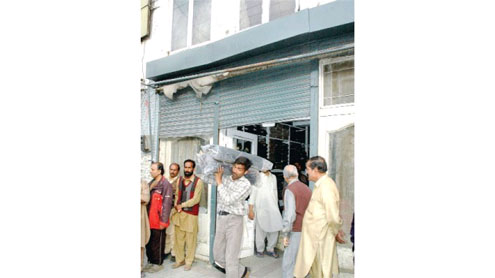 THE famous restaurant Pak Tea House at Neela Gumbad Chowk, where writers and intellectuals of Halqa Arbab-i-Zauq and Punjabi Adbi Sangat used to meet and have discussions will be reopened within the next 15 days.
THE famous restaurant Pak Tea House at Neela Gumbad Chowk, where writers and intellectuals of Halqa Arbab-i-Zauq and Punjabi Adbi Sangat used to meet and have discussions will be reopened within the next 15 days.
City District Government Lahore (CDGL) retrieved the restaurant being used as a cloth warehouse and asked the managers of Young Men Christians Association (YMCA) to resurrect the literary activities there.Punjab Chief Minister Shahbaz Sharif directed the Lahore commissioner to take possession of the restaurant and reopen the historical place for literary activities.
On Thursday, a CDGL team, including Data Gunj Buksh Town TMO, visited the said place and sealed the warehouse. Later, they asked the warehouse owner to shift the goods kept there within the next 24 hours. They asked the YMCA’s managers to take hold of the restaurant and reopen the Pak Tea House within next 15 days on their own expenses.Pak Tea House, established in the YMCA building near Neela Gumbad, Shahrah-e-Quaid-e-Azam, was the only historical literary hub of Lahore. Before Partition, Pak Tea House was known as India Tea House and a Sikh family ran it.
After Partition, Siraj-ud-Din got this place on rent from the YMCA administration and renamed it as Pak Tea House. From 1960 to early 1970’s, meetings of Halqa-i-Arbab-e-Zouq were held in the YMCA building, which later shifted to Pak Tea House. Poets, writers and intellectuals, including Intezar Hussain, Qayum Nazar, Anjum Romani, Saddat Hassan Manto, Ali Sufian Afaqi, Israr Zaidi, Mustansar Hussain Tarar, Dr Agha Suhail, Asghar Nadeem Syed, Amjad Islam Amjad, Ahmad Nadeem Qasmi, Ahmad Rahi, Qateel Shifai, Muzaffar Hussain Syed, Raja Ghalib, Ahmad Mushtaq, Munir Niazi, Habib Jalib, Munoo Bhai, Nazir Naji, Sardar Ahmad, Siddiqa Begum, Nudrat Altaf, Altaf Fatima, Maqbool Khan Maqbool, Meera Jee, Sahir Ludhianvi, Younas Adeeb, Salim Shahid were among the prominent members of Halqa-i- Arbab-e-Zauq.
Different cultural, literary, showbiz people and politicians used to occupy permanent places in the hall. Similarly, the people who came to Lahore from other cities for education and job purposes also occupied a place in the Tea House. The Pak Tea House also served them as their mailing address. The foreign tourists, who stayed at YMCA Hostel, also used to take their meal from Pak Tea House, as the food served here was qualitative and less expensive.
When the revolutionary poet and author of famous poem ‘Aisay Dastoor Ko Subah-e-Benoor Ko Mein Nahi Manta Mein Nahi Manta, Habib Jalib, was arrested during Ayub regime, the gentry at the Tea House collected funds to help him. Former Premier late Zulfikar Ali Bhutto along with Nusrat Bhutto also visited Pak Tea House to express their solidarity with them and donated Rs 600. Nusrat Bhutto also attended the meeting of Halqa-i-Arbab-e-Zouq during Ayub’s martial law regime.
Pak Tea House was closed by its owner Zahid Hasan, who is presently running a cloth business in YMCA building. He said that he was not physically fit to run the tea house anymore because of heart surgery and his sons were not interested in the business.
He wanted to open a more profitable venture – a tyre shop. However, a committee of senior writers tried to persuade the owner not to close it. For them, it was a cultural icon of not only of Lahore but of the whole Pakistan.After the closure of the restaurant, Chaupal at Nasser Bagh was the place where writers and intellectuals of Halqa Arbab-i-Zauq and Punjabi Adbi Sangat gathered.
The place was provided by the government and its only room was being ignored by the managers.Moreover, the area became very crowded and traffic noise was almost unbearable. The Halqa moved to the air-conditioned building of Aiwan-i-Iqbal but the Sangat refused to shift and it still holds its weekly meetings here on Fridays. – Thenews












